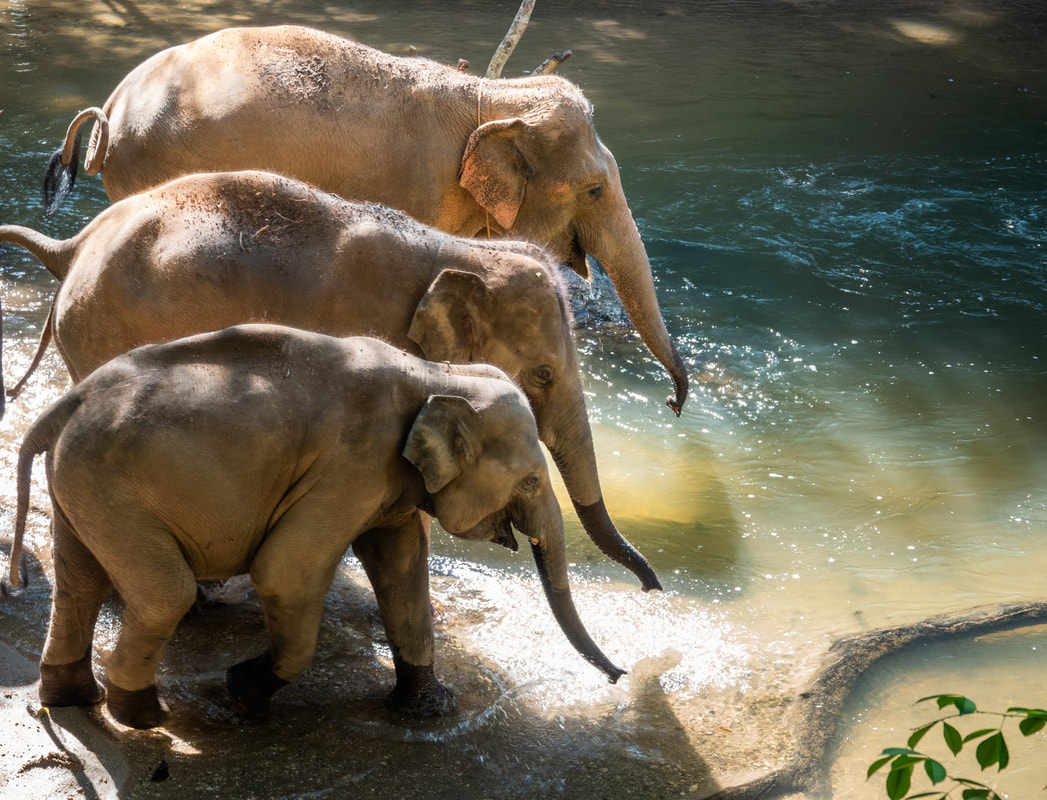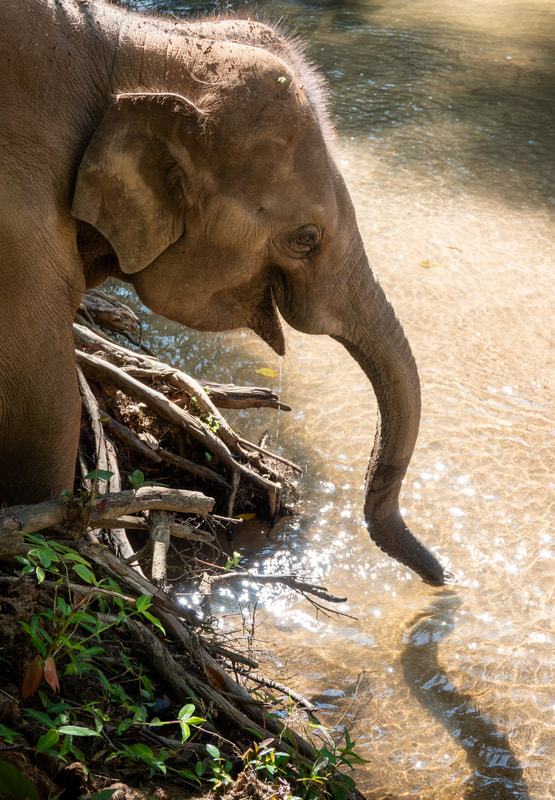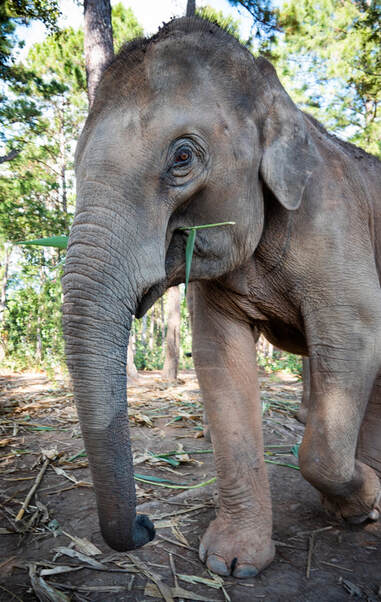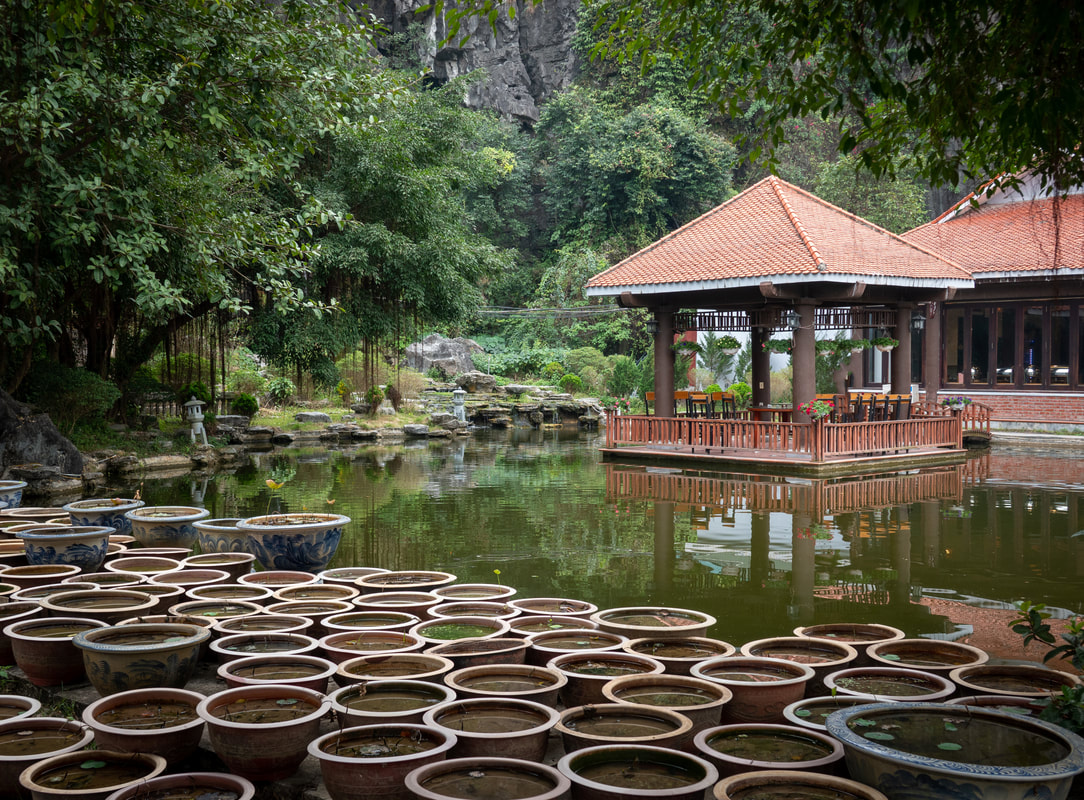|
When we arrived at the elephant sanctuary, all of the elephants were dusty and had actual dirt clumps all over their backs. I just assumed they had been playing in the dirt and some accidentally got stuck to their backs. I rationalized that, even with a trunk, the back is a tricky spot to reach. You can imagine my confusion when, after taking them down to the river to bathe, some of the elephants got out of the water and, using their trunks, would immediately start picking up dust to throw onto their own, freshly cleaned, backs. They did this over and over until they were dusty and dirty again. I later learned that elephants can get very sunburned, and the dust and dirt on their backs acts as sun protection. And apparently also serves as an insect deterrent as an added bonus. The more you know!
"Elephants gather sand and mud with their trunks and throw it onto their bodies, providing sun protection and repelling bugs. Sand helps dry and warm their skin in the cooler months, while mud helps to keep them cool in the hotter months." -Smithsonian Institution
0 Comments
While at the elephant sanctuary, we got to take the elephants down to the river to bathe them and watch them play in the water. It was particularly neat observing the incredible use of their trunks. We saw them use their trunks for drinking water, sorting ripe vs underripe bananas, selecting the best bits of sugarcane to enjoy and even picking up small little sunflower seeds to eat. Insanely powerful, yet easily doing all the tasks a human hand could do. Quite impressive!
"An elephant trunk has up to 40,000 muscles. A human has more than 600 muscles in the entire body. Elephants use their trunks to help them suck up water for drinking, pick up or touch objects, trumpet warnings, and greet one another." -WWF While in Chiang Mai, Thailand, we made the decision to visit an elephant sanctuary. At first, our group was a little hesitant on the idea because there are a lot of ethical questions involved and we didn't want to unknowingly contribute to the mistreatment of these incredible animals. However, after doing our own research, as well as gathering recommendations from friends who had done their own research, we decided to include it in our plans. We ended up visiting a project, Elephant Freedom Village, run by a family from the Karen hill-tribe. The warmth of the people and their connection to the elephants was obvious. And it ended up being a really beautiful experience. Being able to interact with, touch and feed these enormous and ancient animals was something special and unique. I will obviously be posting more photos from this experience, but I did feel it important to share the ethics of this decision before sharing any more photos. Humans have an unbelievable ability to mistreat animals in really sinister ways, however we did not encounter any of this in our experience and in our research with regards to this particular project.
"We admire elephants in part because they demonstrate what we consider the finest human traits: empathy, self-awareness, and social intelligence. But the way we treat them puts on display the very worst of human behavior." -Graydon Carter It is incredibly easy to get stuck in our own rut, or own routine and start to believe that how we do things is the best way, or the only way. And maybe it is. But when we travel we get exposed to new ways of being, doing and seeing. It is often not until we step out of our own culture that these other ways of life engulf us, sometimes for the better, sometimes for the worse. Either way, that culture tends to become a part of us, even in a small way. Perhaps it's simply a memory, perhaps it's a confirmation of how great your own culture actually is in comparison, but often I find that it's an awakening to ways in which you and your culture can be better as a whole. For this reason, I believe travel to be an incredibly enriching and educational experience. One of great importance for personal and societal growth. And it happens to be unbelievably fun as well.
"Leave home, leave the country, leave the familiar. Only then can routine experience—buying bread, eating vegetables, even saying hello—become new all over again." -Anthony Doerr |
Archives
March 2024
|




 RSS Feed
RSS Feed